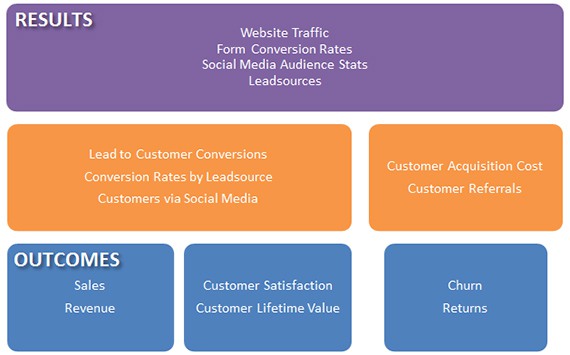When studying the effectiveness of short and long term marketing campaigns, you might see that all the metrics—like opt-ins, page views, and bounce rate—seem to be on target. But still, you have a feeling that the campaign just didn't work the way you had hoped.
In marketing, two seemingly synonymous terms—outcomes and results—actually aren't the same. Here, we explain the differences.
Outcomes vs results
Results are the smaller metrics that make up a marketing campaign. Realizing their meaning often requires context and explanation. Focusing on results often means relying on a series of tactics to achieve a short-term goal.
Outcomes are the larger, meaningful developments that indicate success in your business. They're tangible outcomes and related to long-term growth, not short-term gains.
Here's an example that illustrates the difference:
My website had 1,800 page views last month. From there, I had 18 opt-ins and 5 sales. I also had a 62 percent bounce rate and had 40 percent of my traffic come from organic search. I feel like I need more traffic and need to lower my bounce rate so I can see a better sales outcome.
The outcome in this example is that the business gained five customers last month—a measurable, meaningful number that directly correlates to the success of the business. The other results—like page views and bounce rate—are useful, but adjusting your website to tweak those stats individually would be a fruitless, challenging and ineffective effort.
If you focus on the myriad results here, you could sacrifice the larger outcome of having paying customers. Looking at results without being aware of outcomes can be a costly mistake.
 Here is a diagram that helps separate metrics between results and outcomes.
Here is a diagram that helps separate metrics between results and outcomes.
Working toward valuing outcomes over results might be a long process—but one that is likely to make a positive impact on your business.
For instance, instead of rewarding your marketing staff for the volume of leads, reward them for high-quality, high-performing leads and ultimately, customers. Depending on your business, you should be aiming high—attracting only the best customers who don’t cancel and refund your products and apply more incentives for long-term customer value.
Looking for outcomes
Sales outcomes and results outcomes can be seen by examining your entire customer lifecycle. Look at everything from website traffic, to conversions, sales, customer acquisition costs, revenue per customer, customer satisfaction, and churn (product return/cancel) rates. Look for disparate results that lead to less than desirable outcomes. Be on the lookout for what contributes to the bottom line and what doesn’t.
If you have a complex business dashboard of stats and analytics, consider exactly what you would need to look at to run the business successfully. To point you in the right direction, consider that Google Analytics is chock-full of results; your CRM software is full of results and outcomes; your accounting software is full of outcomes.
The limitation of this concept is when you’re exploring new marketing methods and learning. Every business has to invest resources into trying new ideas. When exploring uncharted territory, it would be a good idea to maintain a certain level of innocence and naivety. It allows for natural (not forced-because-I-need-to-be-right) outcomes. Some sales and marketing activities simply will not work for your business, and you need to be able to accept that without shame. Other activities do perform well, but you might not know if you focused primarily on the results, not the outcomes.


